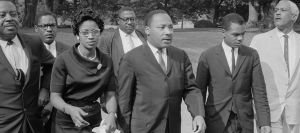Today is Martin Luther King, Jr. day in the United States — the day we commemorate the birthday, life, and work of prominent African-American civil rights activist Dr. Martin Luther King, Jr.
King is often remembered and celebrated for his work surrounding desegregation in the South, starting with the Montgomery Bus Boycott in 1955 to the March on Washington in 1963, where he delivered his seminal “I Have A Dream” speech, to the march on Selma two years later.
What many people don’t know, however, is that in the mid-60s, King began turning his attention northward to metropolises such as Chicago, where many African-Americans had moved to escape Jim Crow.
In these cities, blacks faced a number of issues, namely housing and job inequality — something King became focused on and passionate about as evidenced with the launch of the Poor People’s Campaign the year before his death.
“We are here today because we are tired,” Dr. King said, according to a transcript of a 1966 speech he made at Chicago’s Soldier Field. “We are tired of paying more for less. We are tired of living in rat-infested slums… We are tired of having to pay a median rent of $97 a month in Lawndale for four rooms while whites living in South Deering pay $73 a month for five rooms.”
“Now is the time to make real the promises of democracy,” he added. “Now is the time to open the doors of opportunity to all of God’s children.”
 3 digital marketing resolutions for agents in 2018
Build your brand and grow your business by focusing on these 3 goals READ MORE
3 digital marketing resolutions for agents in 2018
Build your brand and grow your business by focusing on these 3 goals READ MORE
According to articles by HuffPost and NPR, Dr. King spent much of 1966 in Chicago, even moving his family to an apartment on the city’s predominately black west side. There, King and Southern Christian Leadership Conference (SCLC) launched the Chicago Open Housing Movement, whose goals included the rehab of public housing, increasing the supply of affordable housing, pushing for diversity and integration in businesses and unions, a $2.00 minimum wage and the abolition of wage garnishment.
Over the course of the year, King and SCLC activists held city-wide rallies, planned demonstrations in front of real estate brokerages and marched into Chicago’s all-white neighborhoods, which were met with violent reactions from the city’s white residents.
“Well, this is a terrible thing,” said King in a soundbite acquired by NPR. “I’ve been in many demonstrations all across the South, but I can say that I have never seen, even in Mississippi and Alabama, mobs as hostile and as hate-filled as I’m seeing in Chicago.”
Eager to quell the violence, Chicago’s mayor, Richard J. Daley, agreed to meet with King and other activists in August 1966 to work out an agreement, which included building future public housing with “limited height requirements,” and requiring the Mortgage Bankers Association to make mortgages available regardless of race.
King hailed the agreement ‘‘the most signi?cant program ever conceived to make open housing a reality,’’ but tempered his assessment by recognizing it as only “the ?rst step in a 1,000-mile journey.’’
Historians say King’s Chicago Open Housing Movement laid the groundwork for the 1968 Fair Housing Act, which ensures that all Americans have access to equal housing opportunities and outlaws discrimination based on an individual’s race, color, religion, sex, national origin, disability or familial status.
Although the Fair Housing Act has improved the living conditions of Americans, many readily point out there is still much work as evidenced by disproportionately low homeownership rates for blacks, rampant gentrification in communities of color, a lack of affordable housing for low-income individuals and families, and concerns about new technologies, such as Facebook, being used to discreetly discriminate.
“And we have to continue in the legacy of MLK and the civil rights movement and the legacy of abolition movements of before,” said Paige May, a Chicago resident who spoke to NPR after an event to celebrate MLK.
“We have a lot of work to do, but it’s also — it feels like a day that’s celebratory in a lot of ways, right? But in the sphere of struggle and resistance.
Source: click here














